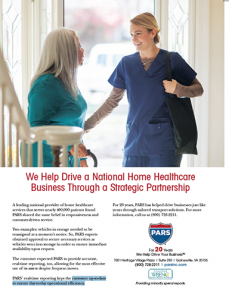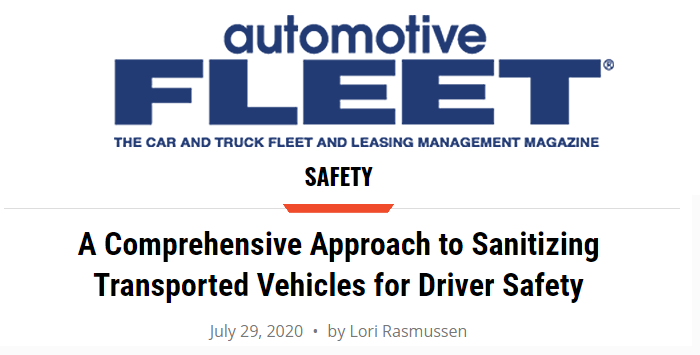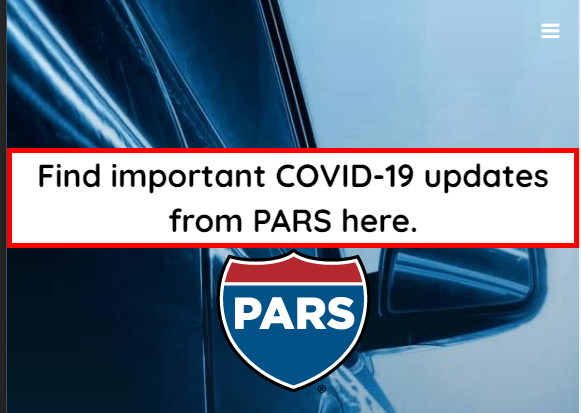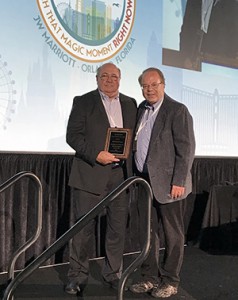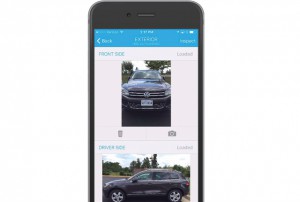Automotive Fleet magazine just published a timely article written by PARS President Lori Rasmussen. “A Comprehensive Approach to Sanitizing Vehicles” provides a detailed list of ways to protect fleet drivers in the age of COVID-19. Click on this image to see the article…
Uncategorized
Lori Rasmussen Provides Insights into COVID-19 Impact on Fleet Transport
On May 6th, PARS President Lori Rasmussen participated on a panel of fleet leaders for the AFLA-Bobit webinar series on the topic of the “Latest Market Intelligence on COVID-19 Impact on Fleet Operations and Supply Chain Partners. Panelists included Kristofer Bush, Vice President, Product Management for LeasePlan and Colin Sutherland, Executive VP, Sales and Marketing for Geotab, and the moderator, Mike Antich, Associate Publisher of Automotive Fleet.
Here are some of her insights into the impact of the current crisis on the transport industry:
- PARS has had a mobile driver app for the past few years, and its customers can still count on this technology for contact-free pickup and delivery in this new era of distancing.
- While there have been widespread closures of motor vehicle agencies, most states have extended the expiration dates for vehicle registration, temporary tags, driver’s license. About half the states are open and accepting applications online or by mail. Others are processing renewals. Some physical locations are open, but usually by appointment only and limited services. Her recommendation was that any company with expired or new vehicles needing registration get the paperwork ready now because of the influx of requests as agencies reopen.
- Along the same line of thinking, Lori mentioned that we are seeing more maintenance facilities and body shops open up along with some dealerships addressing safety recalls. As a result, companies with idle vehicles should make maintenance appointments now to avoid the re-opening rush of requests.
- Finally, Lori covered some additional points, but the topic that drew special interest was repurposing idle vehicles. She shared the story of a PARS customer whose scientists needed to get into the lab to work on COVID-19 studies, based on Account Manager Wendy Chichester.
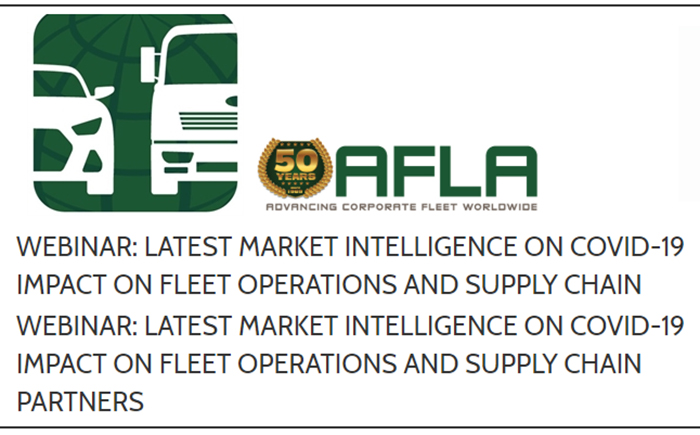
Lori Rasmussen on Panel for Automotive Fleet – AFLA ‘COVID-19 Impact on Fleet Operations and Supply Chain Partners’ Webinar, May 6th
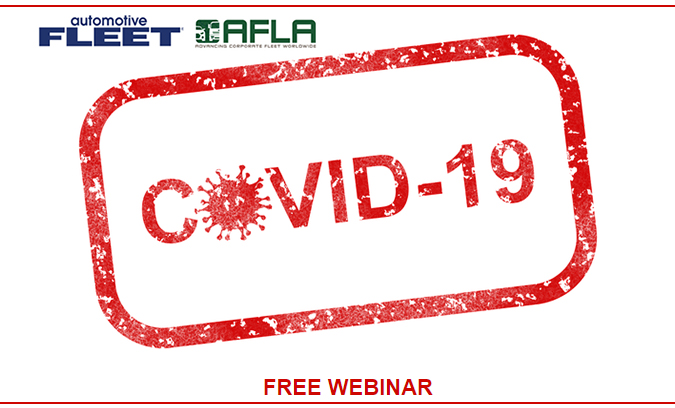
Automotive Fleet and AFLA will conduct the free webinar, “Latest Market Intelligence on COVID-19 Impact on Fleet Operations and Supply Chain Partners” on Wednesday, May 6, 2020 at 11:00 AM PDT (Thu, May 7, 2020 2:00 PM EDT). Among the panelists is PARS president Lori Rasmussen, who will share market intelligence they have gleaned from a cross-section of fleets and how this data can help in managing a fleet during the COVID-19 pandemic.
You can register here!
Key Takeaways:
- Update on the current state of the fleet market coping with COVID-19 as of May 6, 2020.
- Up-to-date industry data, metrics, and market intelligence to help improve operational efficiencies and strategic direction during pandemic.
- Near-term strategies to best position your fleet for the phased reopening of the national economy.
- Best practices to optimize fleet supply chain partnerships during pandemic.
COVID-19 Transport Updates from PARS
Keep updated on COVID-19’s impact on fleet vehicle transport by viewing the PARSinc.com website ‘COVID-19 Update’ link.
PARS transport experts are seeing delays in obtaining some vehicle services and the unavailability of others. We expect that the growing number of state executive orders, or even the possibility of federal orders, will accelerate the rate of closings among state agencies, maintenance facilities, license and titling services, and storage locations that we rely upon to complete our customers’ vehicle relocation projects.
Of course, like all businesses concerned about employee safety and social responsibility, PARS will adhere to all COVID-19 associated governmental directives and CDC safety recommendations. However, our experienced team will review thoroughly and recommend any possible alternative strategies in order to obtain the best results for our customers.
As circumstances change, we will keep you up to date on the impact on service availability. Of course, you can continue to check on your projects through the PARS customer portal, or contact your PARS account person. If you have specific questions around license & titling please email DMV@parsinc.com Any other questions can be directed to dispatch@parsinc.com. Our phone number is being closely monitored so you can expect a timely call back if you leave a message.
Fleet Policies & Procedures to Minimize COVID-19 Contagion
Mike Antich, Associate Publisher/Editor at Automotive Fleet Magazine
Published on March 22, 2020

Fleets are on the front lines dealing with the Coronavirus Disease 2019 (COVID-19), a new respiratory disease that is now a global pandemic. OSHA’s General Duty Clause requires employers to provide a workplace free from recognized hazards likely to cause death or serious physical harm, under which COVID-19 would fall. For many employees, the company vehicle is their workplace. As fleet manager, your mission is to lower potential infections among those using fleet assets and to minimize the risk of spreading the virus to others with whom drivers interact. The virus is primarily spread via person-to-person contact; however, it is also possible to be infected by touching a surface, such as a company vehicle, that has living COVID-19 virus on it and then touching your mouth, nose, or eyes.
It is important to wipe down with a sanitizer and/or disinfectant frequently touched vehicle surfaces, such as the steering wheel, gear shifter, radio, armrest, power window buttons, and door handles. In addition, drivers should sanitize equipment, such as handheld computers, scanners, toolboxes, and cart handles used to haul equipment. However, beware that alcohol- or ammonia-based cleaners may damage the interior dashboard and seats. Ammonia-based cleaners may damage in-cab touch screen terminal displays. On the Web site for the Centers for Disease Control (CDC) is a link with a list of approved cleaners and disinfectants.
· Cleaners are used to remove germs, dirt, and impurities from surfaces. Cleaning does not kill germs, but by removing them, it lowers the risk of infection.
· Disinfectants are used to kill germs on surfaces. It does not necessarily clean dirty surfaces, but if used after cleaning, it further lowers the risk of infection.
Personal Hygiene: Drivers should sanitize their hands after the completion of each delivery or service call. Encourage respiratory etiquette by covering a cough or sneeze with a tissue or sleeve to avoid expelling viral secretions on vehicle surfaces. Encourage drivers to sanitize all commonly used surfaces multiple times a day. In a shop setting, some companies timestamp when cleanings occur to reassure that there is a proactive effort to keep things clean.
Transporting Crews: “Social distancing” is the key to slowing the spread of the virus by breaking the chain of transmission. If there are two passengers in a vehicle, some companies ask the passenger to sit in the back seat to practice a degree of social distancing. Fleet policy guidance is recommended when multiple people or work crews drive together to a job site. Some companies are temporarily limiting the number passengers in single vehicle
Sanitizing Pool Vehicles: Instruct drivers to wipe down every touched surface in a vehicles – first when entering the vehicle and second, when they return it. The coronavirus can survive for 72 hours on a surface before dying if the surface is not cleaned.
Tools and Equipment: Discourage workers from using other workers’ phones, desk, office, or other work tools and equipment when possible. If the driver is using a cart or dolly on their route, they should clean and sanitize it. The same is true for tools used by service techs. Mandate cleaning tools if different techs are using the same tools within a 72-hour period. Also, clean and disinfect tool belts and other gear prior to reuse using a cleaner or disinfectant following application instructions on the product label.
Disposal Gloves: If offered, be sure to make latex and non-latex gloves available because some drivers may be allergic to latex.
Refueling: Instruct drivers to wipe down the fuel pump handle and keypad prior to inputting their odometer and driver ID. If you don’t have wipes, then consider using a paper towel to grab the fuel dispenser handle. Ask drivers to wipe down fuel cards, especially if it is a shared card. Consider assigning a fuel card to each driver to avoid sharing. If drivers wear gloves when refueling, be sure to instruct them to dispose of them before re-entering the cab.
Cabin Filters: Consider accelerating the frequency of replacing cabin filters beyond OEM schedules and recommendations.
HIPAA Restrictions: The Health Insurance Portability and Accountability Act of 1996 (known as HIPAA) makes it a criminal act to divulge medical information without the employee’s permission. If you are informed that an employee has tested positive, inform HR and clean the vehicle. Violating HIPAA regulations could legally comprise yourself and your company.
Customer Interaction Guidelines: Some companies do not require a customer to sign for services or invoices. Instead the driver signs on their behalf to avoid the sharing of pens and devices. It is recommended to avoid letting customers use a company phone and to discourage handshaking. Also, establish procedures on how a driver interacts with another party if involved in a street accident.
Personal Use: Consider whether to modify personal use policies to gain tighter control as who is riding in the vehicle. When companies allow spouses and children to use company vehicles, it loses control over who is a passenger in a corporate vehicle.
Mobile Fleet Service Providers: Some fleets are minimizing driver interaction at service centers by transitioning to mobile fleet service providers to minimize the need to take a vehicle to a shop.
Resources: As fleet manager, you need to stay abreast of guidance from governmental health agencies and consider how to incorporate these recommendations into your fleet.
The CDC provides the latest information about COVID-19 at www.cdc.gov/coronavirus/2019-ncov
OSHA offers information specific to workers and employees – www.osha.gov/covid-19
Commit to doing everything possible to protect drivers and the customers with whom they come in contact and their loved ones. Be positive, empathetic, and solutions driven to help fleet users during this uncertain time.
PARS Holds ‘Service Excellence’ Event
PARS recently brought their 12 field office managers into its Gainesville, VA, headquarters for a four-day Service Excellence event that combined training, an update on customer portal and mobile driver app enhancements, and plenty of socializing and team-building time.
Department heads had the opportunity to review procedures and to take suggestions for further workflow improvement. The meeting provided a unique opportunity to gain and share insight into actions the PARS team can take to improve its service, address customers concerns and expedite customer requests.
The visit was capped with an all-employee dinner that allowed everyone – no matter where they work around the country — to get acquainted. Awards were handed out and employees with 5 and 10 years of service were recognized by management.
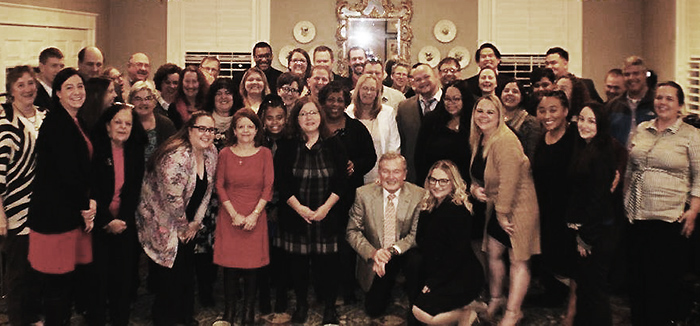
PARS team poses at Service Excellence event





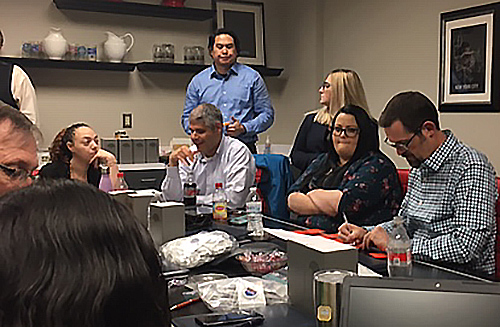
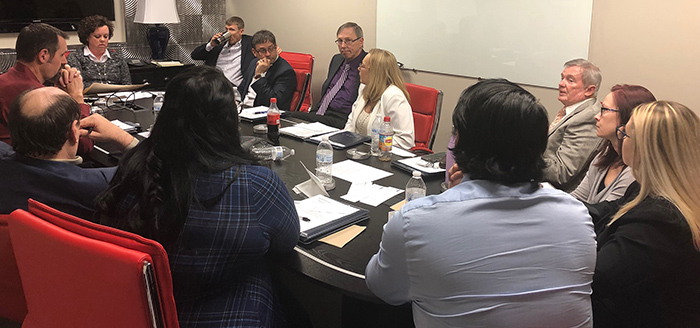



PARS’ Customer Integration: a Win-Win for an FMC and Its Customers
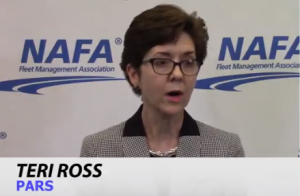 In a recent video interview with Fleet Management Weekly, PARS Vice President of Sales & Client Relations Teri Ross explained how PARS’ advanced systems permit customized data exchange to serve the needs of a fleet management company and its customers. According to Ross, this capability simplifies and speeds management of vehicle transport and associated services. She notes that the FMC account management team can stay within its own account management software to access the PARS customer’s portal to take action, check status of vehicles and any associated repairs, storage, titling, and so on. She notes that this integration is a huge win-win for both the FMC and its customers. Ms. Ross’ complete interview can be found here: https://bit.ly/2E5Wl0c
In a recent video interview with Fleet Management Weekly, PARS Vice President of Sales & Client Relations Teri Ross explained how PARS’ advanced systems permit customized data exchange to serve the needs of a fleet management company and its customers. According to Ross, this capability simplifies and speeds management of vehicle transport and associated services. She notes that the FMC account management team can stay within its own account management software to access the PARS customer’s portal to take action, check status of vehicles and any associated repairs, storage, titling, and so on. She notes that this integration is a huge win-win for both the FMC and its customers. Ms. Ross’ complete interview can be found here: https://bit.ly/2E5Wl0c
PARS Founder Jim Christiano Named to Fleet Hall of Fame at 2018 AFLA Conference
2018 Fleet Hall of Fame Inductees Revealed
October 1, 2018
PARS founder Jim Christiano was named to Fleet Hall of Fame last night during the 2018 Automotive Fleet & Leasing Association (AFLA) Conference at the JW Marriott Orlando, FL. He was selected through an online public survey online. The Fleet Hall of Fame is now comprised of 81 members.
In marking the event, Automotive Fleet summarized Jim’s career:
“Jim Christiano joined Buick in 1971, serving in service and sales roles for the Buick Motor Division at locations across the United States. In 1981, he transferred to Buick’s home office in Flint, Mich., and took on the role of director of fleet sales, his first official role in fleet. He led Buick’s Olympics project, placing 10,000 Buicks on the ground in Los Angeles.
After leaving Buick in 1986, he opened a dealership for a time, which he sold in 1991. He later managed sales for a drive-away business, and founded PARS in 1998. In its first year, PARS quoted 50 moves a day and received 10 orders. Since then, the company has grown dramatically, recently moving into new 10,000 square-foot headquarters in Gainesville, Va. He led PARS until 2006 (when his daughter, Lori Rasmussen, took over), but he remains active in the business.”
Congratulations to Jim, his wife, Marilyn, and his family for this well-deserved honor! (Photo courtesy of AFLA)
PARS Logistics App Provides Real-time Updates for Busy Fleet Managers
Courtesy of Automotive Fleet
Consider the following situation: A fleet management company places an order to vehicle logistics provider PARS to pick up a car from a terminated employee of a fleet customer and to then deliver it to a new hire.
But, after the PARS driver uses the new PARS driver app to assess and document the car’s condition, the PARS customer service team immediately advises the fleet manager of the car’s condition and provides a copy of the signed pick-up condition report with extensive photos.
The fleet manager can see that the terminated employee did not take very good care of the vehicle, which showed numerous exterior blemishes.
“Now the fleet manager can decide, based on the pictures, ‘Do I want to get those blemishes fixed, or do they not look that bad where I could just thoroughly detail the car and deliver it to the new employee without any repairs?’” said Erik Rasmussen, director of strategic operations for PARS.
The above situation is fictitious, but Rasmussen likes to provide examples to show how the new app’s real-time features can benefit fleets. He notes that the app allows fleet managers and fleet management companies to see real-time order updates from the minute a vehicle is picked up or delivered. Never before have customers seen such thorough condition reports with photos standard and available real time, he said.
The New Tech
Previously, the process was paper-driven. PARS drivers would carry three-ply carbon copy bill of lading forms that included the vehicle pickup information, destination information, and a condition report that the PARS driver would fill out.
The problem was it wasn’t real-time, because the PARS driver had to call that information back to a PARS field office representative, and the representative might or might not immediately key it into the system.
“They may key order and vehicle in-formation at the end of the day,” Rasmussen said. “It was not real-time, not comprehensive, and we certainly didn’t capture pictures like we do with the PARS driver app today.”
The new PARS driver app has been about three years in the making. PARS’ previous IT system for vehicle delivery worked well, but in 2014 the company began looking to improve it in areas such as more integration with fleets and fleet management companies’ vehicle management systems. PARS considered whether to rebuild its existing system or start from scratch.
“Ultimately, we decided to start from scratch,” Rasmussen said. The company adopted a customer relationship management (CRM) product that PARS customized for its logistical needs. The system houses all of PARS’ customer and order data and marketing information. The company at the same time implemented a new customer portal and web site.
“And we knew from the beginning that mobile was going to be part of it,” he said.
Evolution of the App
In early 2016, after the new order management system was stable and functional, PARS’ focus immediately shifted to a mobile app. The result is an app with features such as real-time updates to orders available through the PARS customer portal regarding pickup and delivery; and detailed electronic condition reports that provide photos, damage documentation, confirmation of glovebox contents, and capturing of pickup and delivery signatures.
Rasmussen came up with another fictitious example to show how the new app’s real-time features can benefit fleets. The scenario would involve PARS picking up a vehicle from a terminated employee, with the vehicle showing body damage that the termi-nated employee failed to report. In some cases, fleet management companies and fleet managers are now using the information in the PARS app report to charge the terminated employee for the damages he or she failed to report.
“They have the pictures and the detailed condition reporting with the signature, too,” said Rasmussen. “The pickup party and the delivery party both sign these condition reports, so it’s a document they can use in the case of going back and charging separated employees for unreported damage.”
PARS 20th Anniversary Ad Campaign Focuses on Driving Customer Results
In the coming months, PARS will kick off an unusual anniversary celebration ad campaign. Rather than looking back at its growth, continuous investment in the best people and technology, or review its history of service excellence, PARS will focus on specific cases of “helping to drive business results” for its customers through innovative, responsive and customized transport solutions. The first ad details how a leading national provider of home healthcare services that serves nearly 400,000 patients found that PARS shared the same formula for success — built on responsiveness and customer-driven service. Future PARS ads will highlight the value of PARS’ partnerships with companies in other fields.
